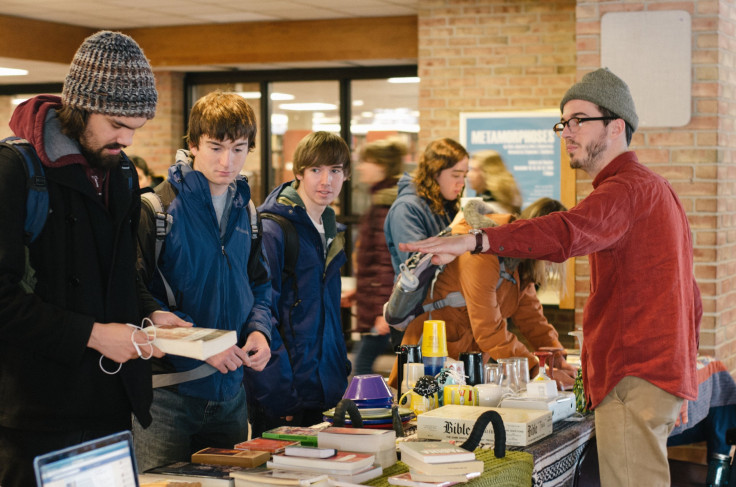Anti-Black Friday Movements Gain Traction With Patagonia Clothing Swap

Amid the Black Friday shopping frenzy, there’s a growing movement of people who aim to buy locally made, ethically sourced and even used gifts — or nothing at all. Their mantra: Be a conscious consumer.
On a recent day at Calvin College in Grand Rapids, Michigan, 500 students and faculty examined boxes of donated clothing and other gently used items to give to friends and family as Christmas presents. Kyle Luck, the student who organized the “Buy Nothing Christmas” free store, called the day “a huge success.”
“There was Christmas music, items given and received, as well as plenty of great conversations about why someone would opt out of Black Friday shopping,” he said in an email. And the five gallons of eggnog and coffee served didn’t touch a single disposable cup, he added.
“Buy Nothing” grassroots groups popped up in Canada in 1992 and gained traction in 1997 when advocacy magazine Adbusters (which later helped start the Occupy Wall Street movement) promoted Buy Nothing Day on Black Friday. The move was an attempt to take back Christmas from corporations and emphasize the environmental impact of hyper-consumerism. In the years following, people began buying nothing to relieve stress, "like psychological yoga," said Kalle Lasn, activist and cofounder of Adbusters. Then after 9/11, people woke up to the fact that the richest 1 billion on the planet consume 70 to 80 percent of the world's resources and considered that the disparity between the rich and poor might be one cause of terrorism, Lasn said. Though largely concentrated in North America, Buy Nothing committees in more than 60 countries have organized "zombie walks" and anti-consumption caroling in malls, credit card cutting parties and do-it-yourself craft fairs over the past decade.
"We’re sick of corporations hijacking Christmas," said Lasn. "Black Friday is one of the most stupid kind of rituals that a society can have."
Another group, the Church of Stop Shopping in New York City, asks a simple question: “What would Jesus buy?” The church sponsors a choir to spread its message that consumerism is harming the earth and its inhabitants. Reverend Billy, the church’s leader, says he’s been arrested more than 70 times in relation to his activism. On Thursday, he’s hosting a Thanksgiving meal on the lawn of Monsanto Co. in St. Louis to protest the huge global agriculture company’s promotion of genetically modified seeds.
What may seem like a fringe movement is entering the mainstream. Outdoor clothing and equipment retailer Patagonia wants customers to trade in worn clothing, books and other items on Black Friday in exchange for other used items or new things, if needed. The California-based company generated $600 million in revenue last year and operates 30 retail stores in the U.S.
“Most brands want you to buy new stuff,” said Nellie Cohen, a social and environmental responsibility analyst for Patagonia. “If you need a new jacket, we would love for you to buy a new jacket, but if you have a jacket already that’s working, well, let’s celebrate that fact.”
Patagonia markets its clothing and gear as high-quality and worthy of decades of reuse and repair. The company’s repair center in Reno, Nevada, processes 30,000 repairs a year for customers. The goal is for a customer to love the product, like a ski jacket, so dearly that he or she not only doesn’t want to replace it but loves it more with every bit of wear and tear. The notion is easier to sell to outdoorsy adrenaline junkies who go in for kayaking and mountain climbing than it is to the typical Black Friday shopper.
The “Worn Wear” program will be staged in eight big markets, including Boston, New York, Denver, Portland and San Francisco. Customers will earn credits through Yerdle, a sharing economy app, for dropping off Patagonia items. The credits will reduce prices of new items or allow trades for other worn items in stores or Yerdle’s online catalog.
Patagonia cites data from the British resource efficiency nonprofit WRAP that keeping clothing for an extra nine months reduces a person’s carbon, waste and water footprints by 20 to 30 percent.
“The idea seems to be really catching on that we can’t sustain this intense level of consumerism,” said Aiden Enns, editor of Geez Magazine, a progressive religious publication based in Manitoba, Canada. “When you get major brands like Patagonia picking up the buy-nothing spirit, you know the tolerance for overconsumption has passed.”
Enns started organizing Buy Nothing events a decade ago. His family began giving each other gift cards for Christmas, then money, which got weird, he said. Now his family members draw names and each shop for one person. Enns makes a present himself instead. Over the years, he’s made a bread board, a journal and wooden figurines with moving arms and legs.
“Buying things and throwing them out is absurd,” he said. “The spirit of Christmas isn’t shopping. It’s life, love, joy, that kind of thing. I’m trying to live into a better way of being that is more harmonious with the earth and the humans on it.”
© Copyright IBTimes 2025. All rights reserved.






















